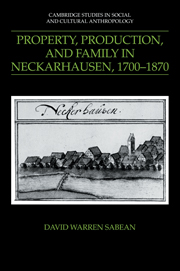Book contents
- Frontmatter
- Contents
- List of tables
- Abbreviations
- Abbreviations of sources
- Weights, measures, and coinage
- On reading kinship diagrams
- Glossary
- Preface
- Dedication
- Introduction
- 1 Productive forces and social differentiation
- 2 Magistrates and records
- 3 The ideology of the house
- 4 Patterns of marital conflict
- 5 The changing context of production
- 6 Marital relations in the context of production
- 7 Marital estate
- 8 State and estate
- 9 Marital fund
- 10 Generational transition
- 11 Reciprocities of labor and property
- 12 Reciprocities in parent–child relations
- 13 Authority, solidarity, and abuse
- 14 Family charges on the transfer of property
- 15 The real estate market
- 16 Kinship and the sale of property
- Conclusion
- Appendix
- Bibliography
- Index
- Cambridge studies in social and cultural anthropology
14 - Family charges on the transfer of property
Published online by Cambridge University Press: 09 February 2010
- Frontmatter
- Contents
- List of tables
- Abbreviations
- Abbreviations of sources
- Weights, measures, and coinage
- On reading kinship diagrams
- Glossary
- Preface
- Dedication
- Introduction
- 1 Productive forces and social differentiation
- 2 Magistrates and records
- 3 The ideology of the house
- 4 Patterns of marital conflict
- 5 The changing context of production
- 6 Marital relations in the context of production
- 7 Marital estate
- 8 State and estate
- 9 Marital fund
- 10 Generational transition
- 11 Reciprocities of labor and property
- 12 Reciprocities in parent–child relations
- 13 Authority, solidarity, and abuse
- 14 Family charges on the transfer of property
- 15 The real estate market
- 16 Kinship and the sale of property
- Conclusion
- Appendix
- Bibliography
- Index
- Cambridge studies in social and cultural anthropology
Summary
Since the [reserved portion] is not sufficient for her necessary support and she cannot be expected in her old age and helpless circumstances to suffer hunger and need, and because it is only just that her children supply the necessary victuals in return for the transferred property ….
- Voluntary maternal devolution of Anna BauknechtIn our analysis of nuclear family relations, we have looked at the many ways property provided an idiom in which social and emotional life was expressed. In this chapter, I want to extend the analysis to the reciprocities, expressed or unexpressed, involved in immovable property changing hands. As we have seen, a great deal of land and many buildings shifted ownership in the process of inheritance, but many parcels were also sold or exchanged among fellow villagers, some related to each other by marriage or blood and some not. Of particular interest here are the conditions put on property devolution and sales, especially the setting up a lifetime rente or annuity.
Annuities
When an aged parent retired, he or she could pass on property in return for specified agricultural labor, produce, care, room, or board. Sometime this was done in the course of an inventory for a deceased spouse and sometimes with a specific inventory for the occasion, a Güterübergabe, Vermögenstradition, or traditio bonorum. In all but one instance of the sample we will examine, this act involved a single parent, which shows that it was unusual in Neckarhausen for an elderly couple to retire at the same time.
- Type
- Chapter
- Information
- Property, Production, and Family in Neckarhausen, 1700–1870 , pp. 341 - 354Publisher: Cambridge University PressPrint publication year: 1991

